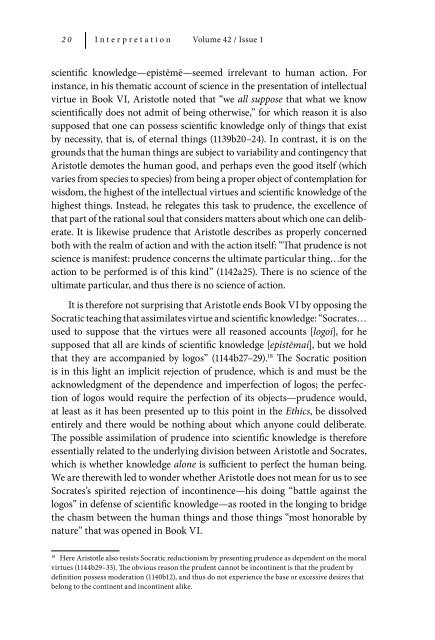Fall 2015
Vol_42_1
Vol_42_1
- No tags were found...
Create successful ePaper yourself
Turn your PDF publications into a flip-book with our unique Google optimized e-Paper software.
2 0 I n t e r p r e t a t i o n Volume 42 / Issue 1<br />
scientific knowledge—epistēmē—seemed irrelevant to human action. For<br />
instance, in his thematic account of science in the presentation of intellectual<br />
virtue in Book VI, Aristotle noted that “we all suppose that what we know<br />
scientifically does not admit of being otherwise,” for which reason it is also<br />
supposed that one can possess scientific knowledge only of things that exist<br />
by necessity, that is, of eternal things (1139b20–24). In contrast, it is on the<br />
grounds that the human things are subject to variability and contingency that<br />
Aristotle demotes the human good, and perhaps even the good itself (which<br />
varies from species to species) from being a proper object of contemplation for<br />
wisdom, the highest of the intellectual virtues and scientific knowledge of the<br />
highest things. Instead, he relegates this task to prudence, the excellence of<br />
that part of the rational soul that considers matters about which one can deliberate.<br />
It is likewise prudence that Aristotle describes as properly concerned<br />
both with the realm of action and with the action itself: “That prudence is not<br />
science is manifest: prudence concerns the ultimate particular thing…for the<br />
action to be performed is of this kind” (1142a25). There is no science of the<br />
ultimate particular, and thus there is no science of action.<br />
It is therefore not surprising that Aristotle ends Book VI by opposing the<br />
Socratic teaching that assimilates virtue and scientific knowledge: “Socrates…<br />
used to suppose that the virtues were all reasoned accounts [logoi], for he<br />
supposed that all are kinds of scientific knowledge [epistēmai], but we hold<br />
that they are accompanied by logos” (1144b27–29). 18 The Socratic position<br />
is in this light an implicit rejection of prudence, which is and must be the<br />
acknowledgment of the dependence and imperfection of logos; the perfection<br />
of logos would require the perfection of its objects—prudence would,<br />
at least as it has been presented up to this point in the Ethics, be dissolved<br />
entirely and there would be nothing about which anyone could deliberate.<br />
The possible assimilation of prudence into scientific knowledge is therefore<br />
essentially related to the underlying division between Aristotle and Socrates,<br />
which is whether knowledge alone is sufficient to perfect the human being.<br />
We are therewith led to wonder whether Aristotle does not mean for us to see<br />
Socrates’s spirited rejection of incontinence—his doing “battle against the<br />
logos” in defense of scientific knowledge—as rooted in the longing to bridge<br />
the chasm between the human things and those things “most honorable by<br />
nature” that was opened in Book VI.<br />
18<br />
Here Aristotle also resists Socratic reductionism by presenting prudence as dependent on the moral<br />
virtues (1144b29–33). The obvious reason the prudent cannot be incontinent is that the prudent by<br />
definition possess moderation (1140b12), and thus do not experience the base or excessive desires that<br />
belong to the continent and incontinent alike.


